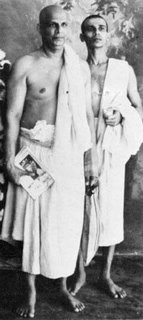
Guru Maharaj :
Meditate regularly in the early morning, which is very favourable time for spiritual contemplation. The mind is calm, pure and quite refreshed. The mind is like a blank sheet of paper and comparatively free from worldly samskaras (mental impressions). It could be moulded very easily then. The atmosphere is charged with more sattva (purity) at this particular time.
Have a separate meditation room under lock and key. Do not allow anyone to enter the room. Or convert by means of screens, a corner of a room into a meditation chamber. Spread a fourfold blanket and over this spread a piece of soft white cloth. Face east or north. Keep the head, neck and back in one straight line. Sit on padma/siddha/swastika or any such asana. Burn incense there in the morning and evening.
When you are a neophyte in meditation, start repeating some sublime slokas or stotras (hymns) for 10 minutes. This will elevate the mind. You must have a mental image (concrete or abstract) of God or Brahman before you begin to meditate.
Swamiji Maharaj :
You should not only have a regular timing but you should also have a fixed place and asana (posture). If the place is kept very pleasant by keeping fresh flowers and burning incense, it will put your mind into a meditative mood. There will not be any distraction. The mind becomes indrawn. Sit in your meditation posture; keep the body erect and straight. Sit steadily without any movement. But always be relaxed. You must be totally at ease.
When you sit for meditation, in the beginning you just sit quiet; get into a mood of calmness. Then try to bring about a sort of channelisation of the thought-flow. Any elevating chant may help you. It should be the same for all days. Mantra-japa produces wonderful spiritual vibrations and is a great help to concentration. It lifts the mind up into a state of subtle awareness of the Divine.
When you sit for meditation, in the beginning you just sit quiet; get into a mood of calmness. Then try to bring about a sort of channelisation of the thought-flow. Any elevating chant may help you. It should be the same for all days. Mantra-japa produces wonderful spiritual vibrations and is a great help to concentration. It lifts the mind up into a state of subtle awareness of the Divine.
The mind runs from one object to another in a continuous succession. As long as the mind exists, thoughts will be there. You cannot suppress it by force. On the contrary, the thoughts will grow even more persistent and stronger. Instead of meditation, you will be diverting your attention towards these thoughts. You must just ignore them, and should gently once again bring your mind back to the focal point. Carry on this process in a non-violent manner. Gradually make (its) area smaller and smaller till the mind is left with only a single vritti (modification or thought), to the exclusion of other vrittis. Ultimately, when you reach the stage of nirvikalpa samadhi even this single vritti will subside..
You should prepare your mind for meditation by filling it with divine bhava - with a feeling or attitude of spiritual affection. Let the thoughts subside, and then gently lift the mind up, out of the self-awareness, out of the consciousness of its union with its immediate surroundings and body. The spiritual concentration is based on the denial of the individualistic personality by affirming: "I am not this body, I do not belong to this perishable world. I am ever-free, ever-present, ever-perfect spiritual entity." Try to tell yourself and feel that there is no universe. Efface the universe from your thought. Now slowly begin to negate your personality. Then what is there? When you feel that there is absolutely nothing, slowly bring in the thought: "The Lord alone IS." Fill the mind with your particular conception of God. These two things - (a) negating the entire world and even your personality, and (b) asserting positively only the presence of the Supreme Being-are powerful helps.
If you are a vedantin, feel that there is only one vast expanse of limitless Existence, unfathomable Peace and infinite Bliss. There is nothing else. Feel strongly the Divine Principle in the innermost centre. Now assert to yourself: "I am ever united with the Being. Om, Om, Om".
Concentration is one percent a question of theory and ninety-nine percent a question of practice, abhyasa. Daily practice alone will help you. Keep up a link of meditation even while a certain portion of the mind goes on doing ordinary work. This method is called Brahma-chintan or Brahma-abhyasa.
No comments:
Post a Comment